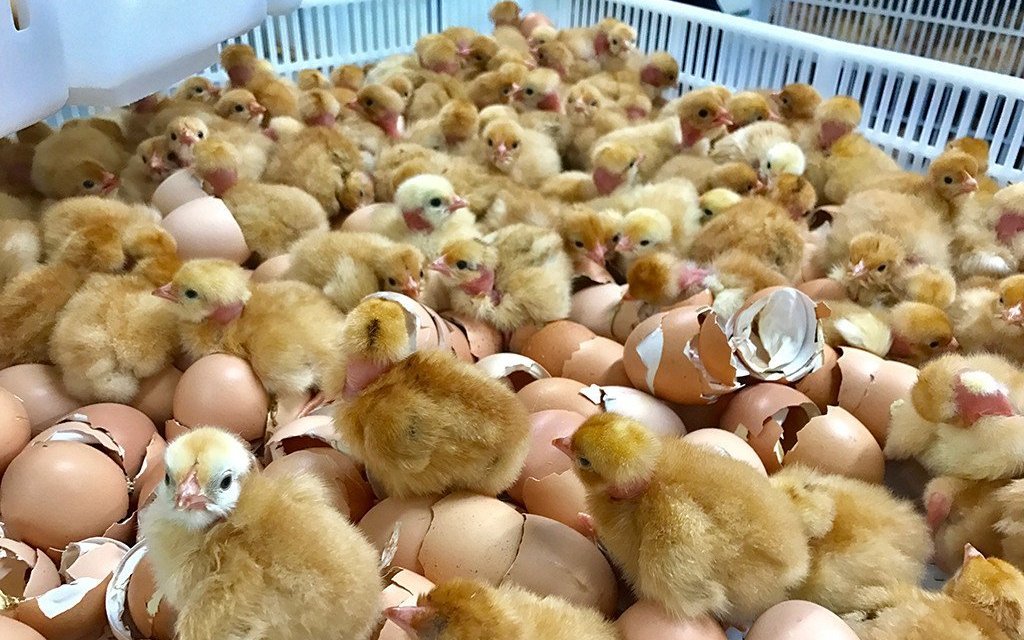Why Don’t Vegans Eat Backyard Eggs?
If chickens are happily roaming someone’s backyard, is it really cruel to eat the eggs that they’re already producing?
Where are the chicks from?
Most chicks are purchased from a hatchery or a farmer. This purchase directly supports an industry that treats chickens like products and machines, rather than individuals worthy of life. In the egg industry, the females are exploited for their eggs for 1-2 years until their egg production declines and they are killed.
Some backyard egg sellers will purchase hatchery chicken and have them delivered by mail (this has been legal since 1918). Stats vary, but it seems that it is expected up to 10% of these infants will die in transit due to the stress of confinement, lack of food and water, and no temperature regulation for up to 72 hours. Hatcheries will commonly add “packers” to the order- these are extra male chicks used as a heat source, packing material, or just filler.
At the Hatchery
Chicks are sexed immediately after hatching, and even the best chick sexers have up to a 10% margin of error in the best of conditions. In hatcheries they can sex up to 4,500/hour, the margin of error can increase. When sexing, males go in one pile and females go in the other. Those identified as male are gassed, suffocated, or macerated on their first and only day of life (7 billion annually).
If a farmer starts off their flock with a hatchery purchase, then allows eggs to be fertilized to hatch their own chicks, at least 50-55% of chicks hatched will be male.
Small-scale farmers typically don’t know the sex until the chickens are a few months old, and most don't want roosters because they don’t lay eggs and they are not bred to have as much flesh as meat chickens. In suburban areas, roosters are typically not even legal to keep. This results in many more roosters being discarded at shelters or abandoned than can be rescued by sanctuaries- so many end up euthanized or killed for dinner.
chicks are overloaded in baskets to be separated according to their sexes
What about chickens adopted or saved from slaughter?
It’s important to remember why hens lay eggs almost daily. We have manipulated their bodies through selective breeding to produce over 300 eggs a year, whereas their un-domesticated counterparts lay 10-20, with the purpose of reproduction.
This mass amount of eggs they are forced to lay severely deplete their bodies of vitamins and minerals, and common health problems include egg binding, egg yolk peritonitis, and prolapses. This is not usually problematic within the industry because they are only used for 1-2 years before being killed.
To combat these issues, many sanctuaries will get hormonal implants for their chickens. This gives them a break from the taxing cycle of egg production and gives them a chance to heal. Anecdotal reports say that implanted chickens live longer and happier lives than their non-implanted counterparts.
Sanctuaries will also often feed eggs back to their chickens. Some hens will eat their eggs themselves without needing help. They really enjoy it, and it is healthy for them.
Backyard eggs sellers, however, are not a fan. Many hobby farm websites suggest filling an empty egg with mustard, despised by chickens, to get them to stop eating their own eggs. They also suggest culling the hens who are in this habit, as they are not serving their desired purpose and could teach other hens to do the same- referred to as an “epidemic”.
This brings us to the most important question: why is someone keeping hens?
If it is solely to benefit from their rigged egg production, they are inherently being viewed as a resource and not as an individual. People do not adopt cats or dogs with the condition they will provide a product worth monetary value- they adopt them because they are an individual worthy of love.
This difference is clear when backyard flock owners will have a hen killed instead of paying for expensive procedures when inevitable health complications come up or when egg production declines. It is very rare to see someone who profits from the bodies of chickens choose to implant their hens, despite it being in the hen’s best interest to have a break from the hell of constant laying that we have imposed on them. They compromise the health of the individuals in their care for profit. That is exploitation.
The most ethical way to take care of rescued hens is not by taking their eggs, but by feeding them back to them and taking steps to reduce the number of eggs they produce, to begin with.
These industries of exploitation only exist in the first place because humans feel they have a right to the bodies of these individuals and base their right to life on the monetary value we can exploit them for.
Sources:
https://theminimalistvegan.com/backyard-eggs/
https://befairbevegan.com/why-vegan/the-animals-we-use/backyard-eggs/
https://plantprosperous.com/can-vegans-eat-eggs-from-own-chickens/
https://www.hsi.org/wp-content/uploads/assets/pdfs/about_chickens.pdf


